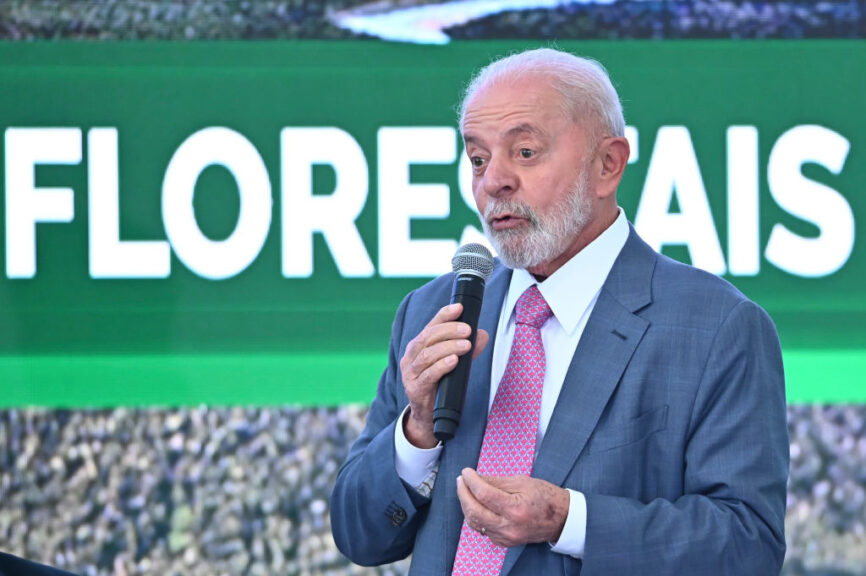This past weekend Brazil’s Federal Supreme Court Justice Alexandre de Moraes ordered X to block a number of popular accounts. Almost immediately after, Elon Musk said that free speech principles matter more than profits. And he announced plans to defy the court’s order and lift all speech restrictions in the country once his employees are in a “safe place” where they are not at risk of being arrested. Musk says he expects he will ultimately be forced to shut down X’s office in Brazil and will lose all revenue there.
On April 7, shortly after Musk’s announcement, de Moraes issued a decision adding Musk to a broader investigation. In this new inquiry, the judge accused Musk of obstruction of justice and incitement to crime. “The flagrant conduct of obstruction of Brazilian Justice, incitement to crime, public threat of disobedience to court orders and future lack of cooperation by the platform are facts that disrespect Brazil’s sovereignty and reinforce the connection of the intentional criminal instrumentalization of the activities of the former Twitter,” he wrote. Many now expect the Brazilian Supreme Court to shut off access to X at any moment.
Nor is X the only American social media company being targeted by president Lula da Silva’s government. Facebook, Google, and others have faced investigations for what the same court called “abusive practices.” Though it appears those platforms have complied with speech restrictions to some degree, Musk is the only big tech executive to have engaged in a public fight with the court.

Ton Molina/NurPhoto via Getty Images
Brazil’s government has leaned heavily on lawfare in its attempt to squeeze American social media platforms into compliance. Before presiding over Musk’s case, de Moraes ordered investigations into big tech executives at other companies after they lobbied against a proposal to regulate Brazil’s internet. If passed, the Law on Freedom, Responsibility, and Transparency on the Internet, colloquially known as the “Fake News Bill,” will levy large fines against the tech companies if they fail to identify and report illegal content.
LISTEN: Catch the full story on Morning Wire
Due to such legislation, the definition of illegal speech in Brazil has been rapidly expanding to potentially include anything labeled “misinformation” by the government. Independent journalist Michael Shellenberger, who is in Brazil and broke parts of this story, said it’s not an exaggeration to say that Brazil is “on the brink of dictatorship.” He lambasted a number of big tech companies for giving in to the demands of Brazilian authorities, saying, “I know censorship when I see it.”
“The Twitter files revealed also that Google, Facebook, Uber, WhatsApp and Instagram betrayed the people of Brazil,” Shellenberger said. “If this evidence is proven and admitted to, the executives of those companies behaved like cowards. They provided the Brazilian government with personal registration data and telephone numbers without a court order. Therefore, they violated the Brazilian laws.”
Musk has said he plans to publish on X everything the Brazilian judge has ordered, and these posts will explain how the court’s demands violate Brazilian law. “This judge has brazenly and repeatedly betrayed the constitution and people of Brazil. He should resign or be impeached,” Musk posted.
But Musk may face opposition not only from the Brazilian government, but also from the U.S. State Department, who some former officials are accusing of helping to engineer Brazil’s censorship efforts.
Former Deputy Assistant Secretary for International Communications and Information Policy Mike Benz said the CIA and other U.S. foreign policy divisions fear rising populism in countries like Brazil. According to Benz, these State Department divisions and associated NGO’s helped President Lula da Silva secure power over his populist rival Jair Bolsonaro by funding censorship groups to suppress so-called election “misinformation.”
“When I was looking into what was behind censorship in Brazil, it turned out what was driving it appeared to be a gaggle of US State Department funded NGOs,” Benz said in a video posted to X. “National Endowment for Democracy, USAID, and the National Endowment for Democracy [were] funding a bunch of domestic censorship groups in Brazil. This actually goes right back to the beginning of Bolsonaro his tenure in 2019.”
Benz added that the State Department doesn’t want to see Brazilian citizens openly criticizing their country’s government on social media any more than Da Silva does.
On April 7, after Musk promised to publish all records pertaining to Brazil’s crackdown on X, Brazil’s Attorney General Jorge Messias called for “urgent regulation” of all social media networks, saying, “We cannot live in a society in which billionaires domiciled abroad have control of social networks…”














